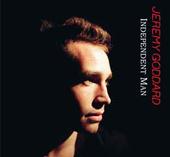A top-quality voice, great stage presence and he plays very accomplished and funky keyboards too!
Edinburgh Evening News
..Jeremy Goddard was funky before he ever came to America. You can hear the English boy in him: the kid from Bristol whose dad taught him how to play piano and gave him the soul for getting down, the young man who spent his time with those Stevie Wonder, Sly Stone, Parliament, and Michael Jackson records, trying to figure out how they made their grooves work. You can hear the trip hop, his hometown’s contribution to the global rhythm, and you can hear Jamiroquai when Jamiroquai was still freaky.
When Goddard was twenty-two, he’d already put together a tight band and brought the funk to tens of thousands under a glaring Edinburgh sun. But he knew he needed to come to America, to see the places where the music he loved came from, to hear as much of it as he could. In Boston, he and his brother bought a 1982 El Dorado and saw Alicia Keys. They saw the Isley Brothers in New York, Maxwell in Philly. They got lost in Philly, ran five red lights to make sure they got out, slept in the car on the Blue Ridge Parkway, ended up in a motel with hookers and drug dealers on Elvis Presley Boulevard in Memphis. They felt the voodoo in New Orleans. And Jeremy Goddard managed to play wherever he went. At Nell’s on 14th Street, he brought down the house with Stevie Wonder’s “I Wish.†In New Orleans, he ended up in a jazz band, half-drunk and swinging; they’d tap him on the shoulder to give him a solo. “Like the bands my dad used to play in,†Goddard says.
He found the funk he was looking for in Memphis, in the clubs where the blues is still a living, walking thing and the people there who play it know whereof they speak. “It had the heaviest feel,†Goddard says, “it moves the feet, it makes you wriggle. It was what came from the gut, it was the roots and history of soul.†You can hear that in Goddard’s music, too: that greasy shuffle, that big heavy downbeat, Al Green’s shout from the church that somehow ends up in the bedroom. But, Goddard says, “I realized when I went to Memphis that I’d already been doing it.†What Goddard found in Memphis was also the thing he had all along.
Listen to the music he writes, or watch him perform, and you believe him. There’s no nostalgia in what he does, no retro irony. There’s just soul. When he’s at the piano, he’s talking to it, he dances with it, the foot that’s not working the pedals is working the floor. When he sings, it’s in a raspy burr, like the smoke from a cigarette between a fine woman’s fingers, but somehow it fills the room. And when he dances, you can see echoes of the kid from Bristol who loves James Brown and Prince, but mostly you just see a man who knows how to get down..
He lives in New York now, does a regular gig at a bar in the East Village, just him and the piano and anyone lucky enough to sit in with him. He’s got a new band that plays Ashford and Simpson’s Sugar Bar; a few of his latest songs have grown up right there on that stage. And his new album, Independent Man, puts it all together. There are heavy grooves and slinky horns, cellos and violins, hip hop, trip hop, funk, and soul, the club and the bedroom, and in the middle of it all, Jeremy Goddard and his piano, with a loudly beating heart and his eyes on the future.
—Brian Francis Slattery
